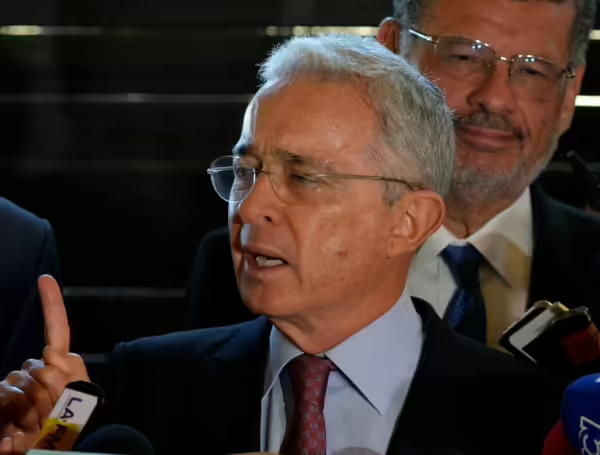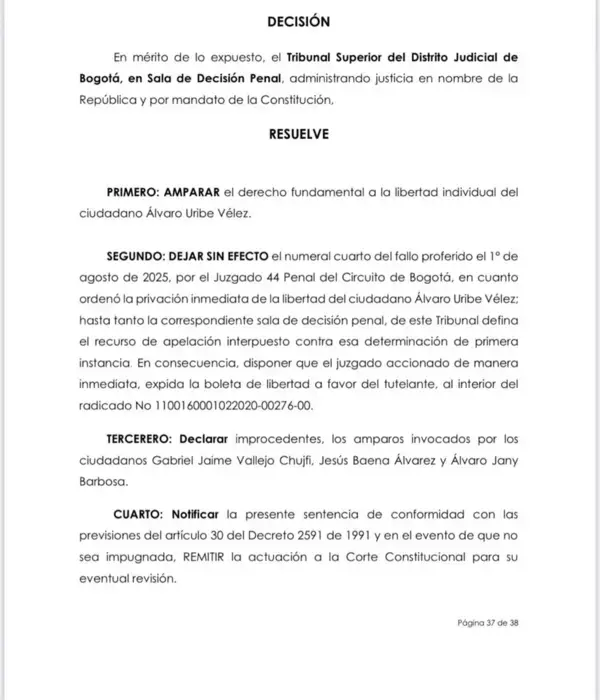The Bogotá Superior Court ordered the immediate release of former President Álvaro Uribe Vélez, who was sentenced to 12 years of house arrest in the first instance, after ruling in his favor on a writ of protection. Among its arguments, it points out that the judge's order was overly argumentative.
After the ruling was read on August 1, the former president's defense, led by Jaime Granados, challenged the decision of the 44th Criminal Court, arguing that there had been a violation of the"fundamental right to individual liberty."
Álvaro Uribe, freed
This action reached the Criminal Chamber of the Court, which will also have to decide on the appeal filed a week ago, on which Judge Ramiro Riaño Riaño pleaded inadmissible. Finally, this court, which served as the guardianship judge in this case, ruled:
"To annul the fourth paragraph of the judgment issued on August 1, 2025, by the 44th Criminal Circuit Court of Bogotá, insofar as it ordered the immediate deprivation of liberty of citizen Álvaro Uribe Vélez; until such time as the corresponding criminal decision chamber of this Court defines the appeal filed against this first instance determination. Consequently, order that the court in question immediately issue the release order in favor of the guardian."

According to the report by reporting judge Leonel Rogeles, Judge Sandra Liliana Heredia's arguments for ordering the immediate arrest of the former head of state—who has been in his home in Rionegro (Antioquia) since August 1—were"vague, indeterminate, and imprecise."
"They are inappropriate because the nature of the conduct alleged apparently affected specific individuals, not the social conglomerate in the abstract. Therefore, it is incomprehensible why this deprivation of liberty is necessary for peaceful coexistence and social order," the judge said.
In the writ of protection, the former president's defense argued that Uribe Vélez had complied with the case, which dates back to 2017. He had spent seven years appearing before the courts, even after being ordered into preventive detention in August 2020 and being released the following October.
On this point, the Criminal Chamber found no evidence of former President Uribe fleeing the country, as Judge Heredia stated in her decision, which focused on the former president's public and political recognition.
"There was no evidence of an intention to flee by leaving the country, or that any asylum or refuge procedures had been advanced, so there is no objective evidence of evasion and in a State of Law, the security measures cannot be based on supposed future risks, merely hypothetical or on conjectures derived from the social recognition of the accused, but rather on impartial, current and verifiable circumstances that make their imposition indispensable to protect the process and/or the victims, regarding whom, when motivating the measure, no specific pronouncement was made," the document says.
The Court also highlights the former president's good behavior and voluntary attendance at the trial, which contradicts the need for immediate deprivation of liberty.

"Furthermore, the judge is not allowed to justify the decisions based on subjective, generic or abstract criteria, which prevents an adequate exercise of the contradiction, especially when fundamental guarantees such as freedom are restricted. The judge did not examine favorable circumstances such as voluntary appearance, absence of procedural breaches, absence of criminal record, or a proven risk of repeat offenses," the ruling states.
It is also stated that the judge did not respond to the criteria of necessity, suitability, proportionality and reasonableness, by basing herself mainly on general, imprecise, subjective arguments, disconnected from the procedural reality or unproven, to the detriment of the fundamental right to individual liberty.
"Nor can it be ignored that the process has passed the evidentiary phase, so the risk of compromising procedural truth or tampering with evidence is, in practice, nonexistent. In this context, the purpose of"ensuring that the administration of justice is not subject to manipulation" loses its factual basis, since the persuasive means have already been collected, debated, and assessed."

